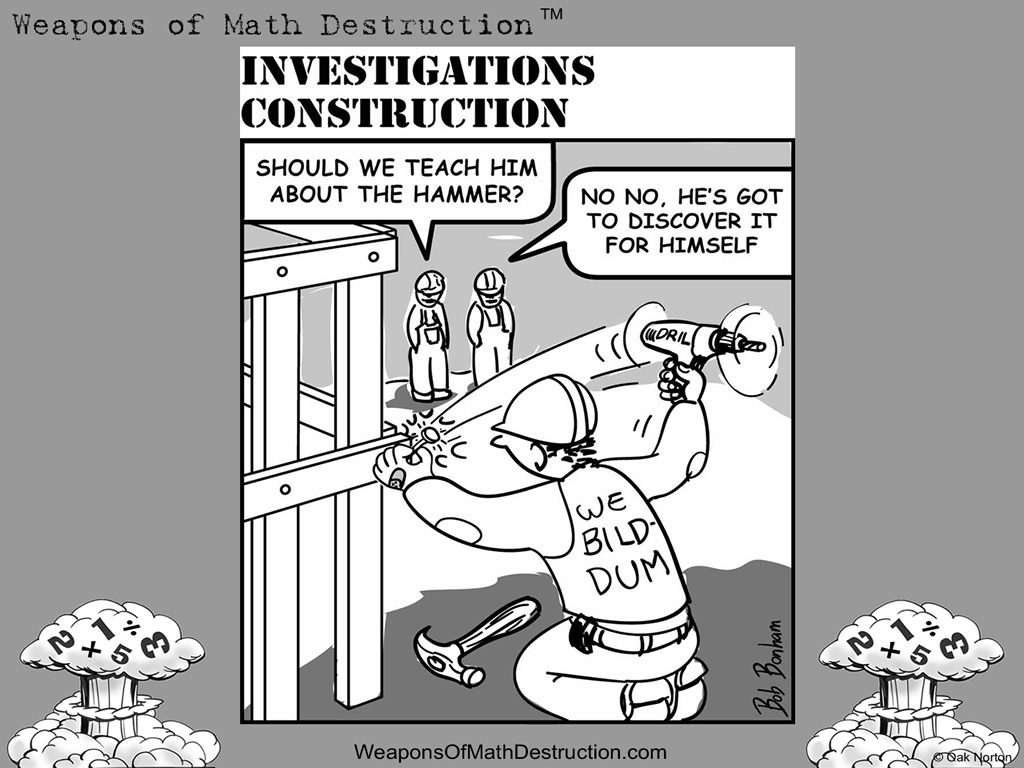At what point do we pull the plug?
Anonymous
0r the instruction was fine, but not everyone is cognitively able to learn and retain the ideas. |
Anonymous
No one is going from "AoPS Algebra in 5th grade" to "remedial". |
Anonymous
How did the AMC 10 and AIME go? |
Anonymous
True but that is because AoPS wouldn’t allow a kid into the class that doesn’t belong there. Both AoPS and RSM screen kids for placement to make sure kids are where they belong. I have seen kids in my DSs group need help with the class. RSM has homework help available for their classes. |
Anonymous
| There’s only been 9 days of school. Your DC has a lot of anxiety in less than 2 weeks. This might be something other than math class? |
Anonymous
Learning is not the same as remembering. Learning is using logic and reasoning to understand something. The fact that you seem to be almost proud of this, says a lot about what is wrong with the culture of education in this country. |
Anonymous
Very true, this is why it's so important to carefully teach kids the ideas and concepts in elementary school. Right now we have an alarming number of students who are taking things like calculus in high school but struggle with basic algebraic operations, or even very fundamental things such as fractions. This suggests that they mainly memorized their way through math and did not really understand things. How do we fix this? I don't really know, because most teachers who teach elementary (or even middle) school don't really understand the ideas, they just teach procedural steps. This then propagates to the students, some of whom then become future teachers. |
Anonymous
Oooh "this country" #AmericaBad |
Anonymous
Humble brag much ? |
Anonymous
It can be that they don't memorize enough. With little direct instruction, learning multiple algorithms but mastering none, and limited homework, many kids are not solid enough on their facts and procedures. |
Anonymous
No, this is not an issue. The whole purpose of school is to memorize and regurgitate on tests. Schools heavily focus on following procedural steps and repetition of calculations. The kids have it down for the test but they have not really understood it, which is why they get in trouble later. Some have trouble in algebra class, some at later points, some during calculus, and some make it all the way to college but find out that their first year engineering classes are very different and require thinking and problem solving vs recalling facts. Trust me, this is not a memorization issue, it's an understanding issue. |
Anonymous
Math-field higher education instructor and parent of kids in AAP here. The issue is multi-fold, and begins with inadequate instruction and lack of practice/reinforcement. If any AAP math teachers are posting here, do you mind sharing your thoughts? When you only play videos and follow with a quiz to see how many students already learned the concept somewhere else, do you skip the instruction for that topic? Whatever your policy is, do the guidelines come from your school, FCPS, or is it your personal preference? Do you ever reveal to parents that you have skipped instruction because 90% of your class aced a 5 minute quiz? As a math professional, I am appalled with the approach taken by some of the AAP teachers and I am genuinely curious where all this is coming from. Students coming to college and for graduate studies lack so many basic math skills today. I get it that not everyone has the same ability to learn math. However, flying over fundamental ES concepts does not help anyone. I though AAP math would be different, and it is, but only in the sense that if you want your child to succeed you must either enroll your child to outside math enrichment program or teach your child on your own. AAP math at my kids’ school is like a track meet, not a place to learn new things. |
Anonymous
Let's summarize the main criticisms of USA math education: 1. Too much rote memorization that doesn't teach conceptual understanding. 2. Too much conceptual teaching that parents don't understand, instead of rote memorization that builds fluency. |
Anonymous
Very funny. But, the whole "rote memorization" is a red herring - it's eduspeak made up by the "math reformers" - in actuality, there isn't much of it. Speaking from my own child's experience, there was an appropriate amount of it when they memorized their multiplication tables with a program called Reflex Math that measures fluency in those. There's also no shortage of practicing simple symbolic manipulations, albeit far too late in the curriculum. DC does 15-20 book problems in Algebra I and Geometry I every night. All of these problems are straightforward. The main criticism is lack of differentiated challenge, combined with introducing symbolic manipulation and algebraic manipulations far too late in everybody's curriculum. This otherwise too optimistic article from 2016 summarizes it nicely: https://www.theatlantic.com/magazine/archive/2016/03/the-math-revolution/426855/ I understand that some teachers don't do the appropriate amount of practice, substituting math reform techniques instead, which are nicely summarized here: http://www.weaponsofmathdestruction.com/wallpapers.cfm 
That is another big problem since this crap seeps into instruction and uses up time that could be used on math. |
Anonymous
#2 is simply not true. Have you looked at your kid's homework assignment? Extremely rare to see anything other than boring calculations that require straightforward applications of procedures, with little thinking. That is akin to memorization, because that is what the kids do in their mind, memorize the procedures so they can pass the tests. They have almost 0 conceptual understanding, and that is the big reason why they cannot retain and apply what they learned in elementary school when they take higher classes in middle and high school. |
